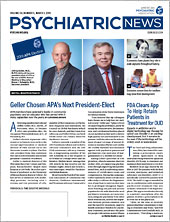Neuropsychiatry is an area of consultation-liaison psychiatry (C-L psychiatry) that focuses on the treatment of patients with psychiatric symptoms caused by brain injury or dysfunction. For example, neuropsychiatrists might work with patients who experience hallucinations as a result of seizures, manage psychiatric symptoms that emerge following a stroke, and adapt treatment plans if psychiatric symptoms worsen over time from tic disorder.
C-L psychiatrists are uniquely positioned to see evolving presentations of psychiatric symptoms in outpatient settings and over the course of medical hospitalizations. They are well-equipped at collecting information on a patient’s neurological and psychiatric history and recognizing missing pieces of a patient’s history that could be contributing to a patient’s symptoms and impact medical decisions. With this background, C-L psychiatrists can help tailor and improve the care of patients who have neuropsychiatric symptoms by clarifying symptom timelines, phenomenology, diagnosis, and treatment. This skill set is particularly important for conditions like traumatic brain injury (TBI). TBI is a growing public health problem, and neuropsychiatric disturbances are the most common cause for disability after injury. The following case demonstrates the important role that neuropsychiatrists can play in the treatment of patients with a history of TBI.
Case Study
Ms. A, a 43-year-old woman who had been diagnosed with schizophrenia, was referred for further management of her psychosis. She had requested the appointment to discuss if she should continue to take the antipsychotic aripiprazole—a medication she had taken for four years without any problems. Ms. A reported a history of depression, which fluctuated over time, but she had been in remission for the last 18 months. Ms. A had no family history of psychosis.
According to Ms. A, she began taking aripiprazole after a “nervous breakdown.” Further exploration of Ms. A’s history identified that this event coincided with a hospitalization in a medical intensive care unit (ICU). While Ms. A reported she remained abstinent from drugs and alcohol for four years, around the time of the hospitalization she regularly drank in excess and took opiates and benzodiazepines she bought off the street. She recalled multiple falls while intoxicated, including the night before her hospitalization when her boyfriend found her on the floor at 3 a.m. and put her back to bed. Further information from her boyfriend, mother, and hospital records noted that on the morning of Ms. A’s hospitalization, she became extremely paranoid and made statements that her house was on fire. She fled down the fire escape with her cat in her arms and ran to the nearest grocery store. She had a seizure in the grocery store and was then admitted to the emergency department. Her blood tests, blood pressure, heart rate, and imaging showed a left subdural hematoma—a large collection of blood around the left side of her brain.
Over the next two weeks, records showed that Ms. A was intermittently agitated and combative. She was frequently documented as “disorientated.” She had occasional episodes of a rapid heart rate, but no other signs of medical instability. The medical team diagnosed her with schizophrenia and started her on aripiprazole. She eventually recovered enough to be discharged to a neurorehabilitation facility. She completed rehab in a week, and during that time her agitation, psychosis, and disorientation resolved. She was discharged on aripiprazole and continued this medication for four years without incident and dose change.
During her follow-up interview with a C-L psychiatrist, Ms. A was calm and fully oriented and reported no symptoms except for an occasional headache and intermittent memory problems since her hospitalization. Due to her history of confusion, TBI, and disorientation, the C-L psychiatrist concluded her symptoms during hospitalization were the result of delirium, not schizophrenia, and she was tapered off aripiprazole. She experienced no psychotic symptoms over the last year.
While Ms. A’s symptoms in the ICU appeared consistent with an initial diagnosis of schizophrenia, a deeper dive into her medical history revealed that the longitudinal course of her illness and ultimate abrupt resolution of symptoms suggested that this was a syndrome other than schizophrenia, and more consistent with a delirium. Furthermore, knowledge that she had suffered a TBI before the emergence of these symptoms led the C-L psychiatrist to conclude that TBI was the reason a young, otherwise healthy woman was so vulnerable to a delirium, which is often seen in older or neurologically compromised patients. Being seen in the outpatient setting allowed her case to be followed on a long-term basis, which supported her recovery and maintained psychiatric stability.
In TBI and many other neuropsychiatric conditions, the C-L psychiatrist makes every effort to apply a comprehensive approach to treatment. This includes not prescribing too many medications, stopping medications that are no longer beneficial for the patient, considering all medical problems as possible contributors to psychiatric disease, and collaborating with providers of relevant specialties for optimum medical care. ■


